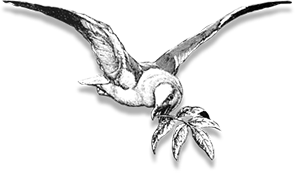'The Planet Mars' Note Card
If you are not currently a member, we invite you to join or renew your membership online.
Plate VIII.
The Planet Mars.
Observed September 3, 1877, at 11h. 55m. P.M.
The luminous illustration on this note card is reproduced from one of Étienne Léopold Trouvelot's original lithographs, a selection of which are on display at the Museum of Jurassic Technology as part of the exhibit, Scrupulous Fidelity: The Astrophysical Illustration of Étienne Léopold Trouvelot. The image is hand-tipped into a debossed note card of substantial, ivory-colored paper stock, and the card is printed on the back with Trouvelot's biographical information. Comes with a matching envelope and is packaged in a protective clear plastic sleeve.
In the early 1870’s, after his well-known if unfortunate efforts in the cultivation of moth caterpillars, Étienne Léopold Trouvelot turned his formidable talents and undauntable curiosity from entomology to astronomy with a series of aurora illustrations. Not unnoticed in the highest of circles, Trouvelot was soon asked to join the staff of the Harvard College Observatory.
Surveying the heavens through the Observatory’s 15-inch Great Refractor, Trouvelot produced hundreds of illustrations for the Astronomical Engravings from the Observatory of Harvard College.
Over the subsequent years, Trouvelot worked on some 7,000 drawings at various observatories. By 1881 he had selected his best work and contracted Charles Scribner’s Sons to produce a set of chromolithographs from which the images in this exhibition were made.
Wary of the rapid ascension of astrophotography, Trouvelot noted in his final years, “A well trained eye alone is capable of seizing the delicate details of structure and configuration of the heavenly bodies, which are liable to be affected, and even rendered invisible, by the slightest changes in our atmosphere.”


